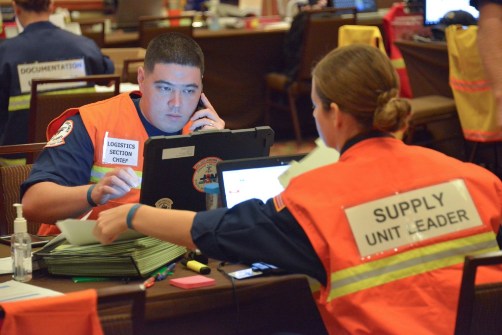Return to Q-Directorate's Home Page.

PUERTO RICO — U.S. Coast Guard Chief Warrant Officer Stephen Bishop and Petty Officer 2nd Class Cassidy Stevens coordinate resources at the Hurricane Maria Unified Command Incident Command Post in San Juan on Oct. 20, 2017. U.S. Coast Guard photo by Petty Officer 1st Class Timothy Tamargo
ICS Positions
As part of the National Incident Management System, a Presidential Directive to the Department of Homeland Security mandates using the Incident Command System (ICS) structure for emergency response to large-scale natural and man-made disasters.
The ICS was developed in the 1970s in response to a disastrous wildfire season in Southern California. The existing command structure was neither effective nor efficient in communicating the needs for managing evolving incidents, with multiple agencies establishing separate command posts for the same fires. The ICS was created to help emergency responders coordinate their efforts to manage future disasters and achieve necessary objectives within an organized structure.
Initially designed for wildfire management, the ICS was later expanded to include all hazards and disaster responses. Local, county, state, and federal agencies across the United States use ICS protocols to respond to incidents such as floods, hurricanes, earthquakes, tsunamis, bridge collapses, oil spills, and other mass casualty events. In such large-scale events, the ICS is designed to bring order to an event involving multiple jurisdictions.
Serving on the incident response side of emergency management (EM) events, Auxiliarists interested in serving the Incident Command System require training and experience to be effective at their jobs.
The U.S. Coast Guard Auxiliary’s Incident Command System has many positions, ranging from field observer (FOBS), to situation unit leader (SITL), and up to incident commander. While most Auxiliarists qualify for entry-level positions, members with prior military service, professional experience, or ICS training may more readily serve at higher levels in the incident command system.
The field of emergency management and incident response is both challenging and rewarding. Auxiliarists seeking career progression in this area are encouraged to learn more about Incident Command System Training and Qualifications and to review the Q-Directorate’s Emergency Management Career Progression Guide.